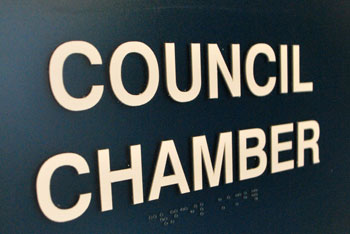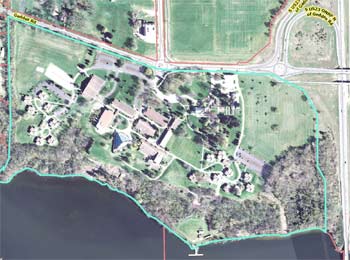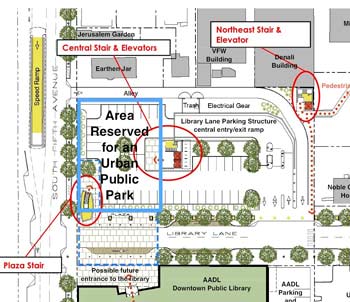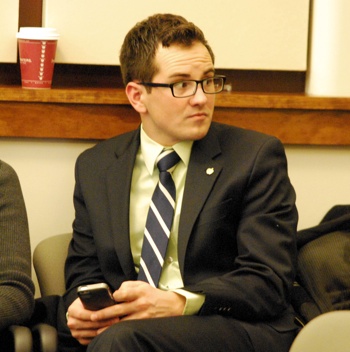Editor’s note: This “Live Updates” coverage of the Ann Arbor city council’s March 3, 2014 meeting includes all the material from an earlier preview article published last week. The goal is to facilitate easier navigation from live-update material to background material already in the file.
The council’s first regular meeting in March will include several items of business leftover from previous meetings, including one resolution on affordable housing, an ordinance on outdoor smoking, and several matters related to public art.

The sign on the door to the Ann Arbor city council chamber, installed in the summer of 2013, includes Braille.
New to the agenda are several items related to non-motorized issues, most prominently a funding request to support the activity of an already-established task force on pedestrian safety and access.
The council will also be asked to fund requests related to city parks and other facilities like city hall and the airport. Eighteen new vehicles will also be added to the city’s fleet, contingent on council action on March 3.
The council will also consider a resolution that urges full funding of the state of Michigan’s fire protection grant program – for cities like Ann Arbor that host state-owned facilities like the University of Michigan.
In somewhat more detail, one public art issue, embodied in two different resolutions, was postponed from the council’s Feb. 18, 2014 meeting, when councilmembers could not agree on an approach to transferring money out of the public art fund back to the funds from which the money was originally drawn. The specific point dividing the council was not so much the transfer of money but rather a plan to fund the transition to a new approach to public art – after the council eliminated the Percent for Art funding mechanism last year.
Between council meetings, those issues have been separated out. The resolution ordered first on the agenda has been altered for consideration on March 3 so that it focuses exclusively on the public art program transition issue. The second resolution incorporates changes to reflect the council’s deliberations on Feb. 18: It transfers a total of $943,005 of Percent for Art money to its funds of origin, an amount that defunds the art project at Argo Cascades, but keeps funding for the Coleman Jewett memorial and for a project called Canoe Imagine Art. [public art resolution (1) for consideration on March 3, 2014] [public art resolution (2) for consideration on March 3, 2014]
That disagreement over funding of the new approach to public art – created by the council last summer when it eliminated the Percent for Art funding mechanism – is also related to another public art item on the agenda. That’s a six-month contract extension for the city’s part-time public art administrator. The item first appeared on the council’s Jan. 21 agenda, but the council postponed that vote until Feb. 3, when it was defeated. On Feb. 18 it was then brought back for reconsideration, but immediately postponed until the March 3 meeting.
Also postponed from Feb. 18 is an item that would direct the city administrator to prepare for the council’s approval a budget resolution regarding affordable housing. The resolution would allocate $600,000 from the city’s affordable housing trust fund to support the Ann Arbor housing commission’s plan to renovate its properties. That allocation would be contingent on the closing of the sale of the former Y lot to Dennis Dahlmann, as the net proceeds of that sale are to be deposited into the city’s affordable housing trust fund.
Postponed from the Feb. 3 meeting was the first reading of an ordinance that would regulate smoking outside of public buildings and also potentially in areas of some city parks. Chuck Warpehoski (Ward 5), sponsor of the new proposed local law, appeared before the park advisory commission at its Feb. 25 meeting to brief commissioners on the proposal and solicit feedback.
New items on the March 3 agenda include a funding proposal for the pedestrian safety and access task force established by the city council late last year, with members appointed in late January. The $122,250 item also includes a $77,500 contract for facilitation services from Project Innovations. That’s the same firm contracted for similar work in connection with the city’s sanitary sewer wet weather evaluation – which is expected to conclude in the summer of 2014. [The total amount being appropriated for the task force project budget in the item is $197,250. The stated “estimated $122,500” is the approximate cost of the anticipated staff effort for this project. The total project budget includes $77,400 for the professional services agreement with Project Innovations, Inc.]
Other issues on the March 3 agenda with a non-motorized connection are three stretches of sidewalk. In the context of sanitary sewer design work that Fishbeck, Thompson, Carr & Huber Inc. is being hired to do, two sidewalks are included: a stretch along Barton Drive, and a stretch along Scio Church Road. The council will also be asked to pay for the construction of a stretch of sidewalk along Ann Arbor-Saline Road near the I-94 bridge – as part of a road reconstruction project that the Michigan Dept. of Transportation is handling.
Another new item is a resolution that Jack Eaton (Ward 4) had announced at the council’s Feb. 18 meeting that he’d be bringing forward. It would waive the attorney-client privilege on a staff memo about laws governing the assessment of homes. The resolution indicates that the memo addresses the effect that reducing the assessment for one year would have on the property tax assessment for the subsequent year, based on action by the Board of Review and/or the Michigan Tax Tribunal.
In other action, the council will be asked on March 3 to approve the purchase from Signature Ford of 18 new vehicles – most of them for use by the Ann Arbor police department. Total cost of the purchase is $457,393.
City parks factor into three agenda items: (1) a resolution to establish an urban park on part of the surface level of the Library Lane underground parking structure; (2) a paving contract for the replacement of basketball and tennis courts at Clinton Park; and (3) a grant application to the Michigan Dept. of Natural Resources Grants Management to support a universal access playground at Gallup Park. The Rotary Club of Ann Arbor has already pledged $250,000 toward such a playground.
The city hall (Larcom Building) is featured in two agenda items – to pay $160,923 for a secondary chiller unit and $28,469 for new light fixtures. An amendment to an agreement with MDOT for an already-completed fence project at the Ann Arbor municipal airport also appears on the agenda, and will cost the city $425.
After authorizing significant equipment purchases to support water main repair activity at its Feb. 18 meeting, the council will be asked to approve two additional items related to water main repair. One item is a $44,702 emergency purchase order to buy more aggregate material used for backfilling water main repairs. A second item authorizes an emergency purchase order for repairing and making a new connection for the water main at 1214 S. University. In both cases, the emergency purchase orders were authorized by the city administrator, and the work was done.
Street closures for two events are on the council’s March 3 agenda: Take Back the Night and the Monroe Street Fair.
Also on the agenda is a resolution that would encourage Gov. Rick Snyder, state senator Rebekah Warren, and state representatives Jeff Irwin and Adam Zemke to explore creative ways to fund the state’s fire protection grant program for municipalities like Ann Arbor, which host state institutions. In the last three years, the program has been only 40-55% funded.
This article includes a more detailed preview of many of these agenda items. More details on other agenda items are available on the city’s online Legistar system. The meeting proceedings can be followed Monday evening live on Channel 16, streamed online by Community Television Network starting at 7 p.m.
The Chronicle will be filing live updates from city council chambers during the meeting, published in this article below the preview material. Click here to skip the preview section and go directly to the live updates. The meeting is scheduled to start at 7 p.m. [Full Story]










